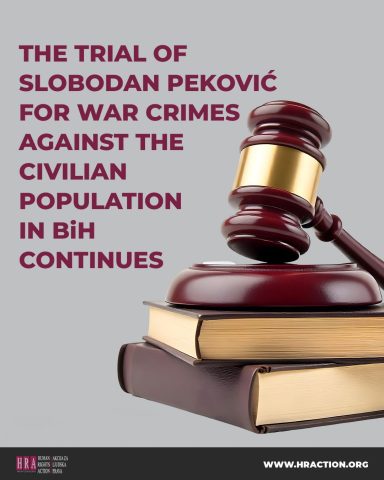
DENYING WAR CRIMES IS A THREAT TO PEACE AND TO MONTENEGRO’S EUROPEAN FUTURE
10/06/2025
INTERNATIONAL DAY AGAINST HATE SPEECH – WHEN WILL THE STATE PROSECUTOR’S OFFICE GET INVOLVED?
18/06/2025THE TRIAL OF SLOBODAN PEKOVIĆ FOR WAR CRIMES AGAINST THE CIVILIAN POPULATION IN BiH CONTINUES

The trial of Slobodan Peković, a Montenegrin citizen accused of war crimes against civilians in Bosnia and Herzegovina, continued last week in the High Court in Podgorica. He is accused of killing Mujo and Emina Šabanović and raping a Bosniak woman in June 1992 in the village of Hum, near Foča, in the capacity of a soldier of the Army of the Republic of Srpska.
Peković denied guilt, stating that he was not in the village of Hum on the day when Mujo and Emina Šabanović were murdered, but rather in Plužine, where – as he claimed – he got into a fight with Obren Gojković and spent the entire day at the police station. However, the presented material evidence shows that there are no records of his crossing the border at Šćepan Polje in 1992. Also, no data was found in the Nikšić Security Centre (police station in Plužine) concerning the above mentioned incident, including misdemeanour reports or daily bulletins for that period, as this type of data are kept for only five years.
The Court read two witness statements concerning the murders of Mujo and Emina Šabanović. The first was the testimony of Mirsad Šabanović, who did not respond to the Court’s summons to testify and the Court had no mechanism to ensure his presence because he is a foreign citizen residing in Bosnia and Herzegovina. He stated that he did not know Peković, but that he heard that he [Peković] was responsible for the murders. The defence contested the credibility of his testimony as it was based on circumstantial knowledge.
The testimony of Ramiza Grcić, who passed away in 2021, was also read in court. She stated that, because of the attack on the village of Hum, she hid in a nearby forest, from where she saw soldiers taking Emina Šabanović out of the house, hitting her all over her body with a shovel, and throwing her into thorn bushes. Then they pulled her by the hair, causing her scarf to fall off her head, following which they dragged her, unconscious, to Mujo Šabanović’s house. After some time, she saw that the house was on fire. Ramiza claimed that she recognised Peković among the soldiers because he took the sock off his head and she knew him well from before. The defence objected to this statement as well, saying that the witness could not be cross-examined and that her statement was “incomplete” regarding certain decisive facts.
In the part of the proceedings related to the rape of the protected witness A1, the Court rejected several proposals of both the prosecution and the injured party’s attorney. The proposal to engage a psychiatric expert to provide an opinion on how the subjective perception of the victim can influence the description of the attacker in cases of sexual violence and war crimes was rejected, as was the request of the attorney of the injured party A1, Dalibor Tomović, for a neuropsychiatric examination which was supposed to serve as evidence of the intensity of mental suffering and damage suffered from 2017 until today, with the aim of determining the amount of the injured party’s property claim. The proposed expert was a doctor from Bosnia and Herzegovina, who examined the victim in 2017 and, at that time, found permanent psychological consequences caused by the rape trauma.
The Court rejected the request on the grounds that expert testimony would lead to a delay in the proceedings. In response, and pointing out the complexity of the case, the injured party’s attorney reminded the Court that he had proposed that the expert examination be conducted by a neuropsychiatrist from Montenegro, or a panel from the Faculty of Medicine, as early as in 2023. He also said that it would be expedient for the property claim to be decided in the course of the criminal proceedings, because in the civil proceedings it would be necessary to reveal the identity of the protected witness A1. This proposal was supported by the special prosecutor Tanja Čolan Deretić, and the Court said that it would present its decision about it at the next hearing.
Finally, the defence proposed to carry out a chemical expert examination to determine whether the defendant had changed his hair colour in the meantime, considering that the witnesses described him as blond and his hair is now dark. Prosecutor Čolan Deretić objected to this proposal, stating that observations about a person’s physical appearance are subjective and that it was precisely for this reason that she had previously proposed a psychiatric expert report on the victim’s perception of the attacker, which the Court had rejected. Nevertheless, the judge presiding over the judicial panel in this case, Nada Rabrenović, made a decision to decide on this request at the next hearing, scheduled for 27 June at 12:30 p.m.
This is the first case in the Montenegrin judiciary that involves wartime sexual violence in which the victim has the status of a protected witness. This means that it is also a test for the Montenegrin judiciary of how it will prosecute rape as a war crime after the Hague Tribunal has rightly treated it, in several complex cases, as a means of war and a form of torture. Domestic courts are expected to demonstrate the ability to take into account and apply international humanitarian law standards for the protection of victims.







 English
English